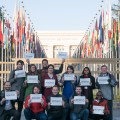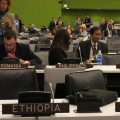A Negotiating Text is Born
Cleo Verkuijl | February 12, 2015.
Wednesday saw legal form and structure front and centre on the agenda as negotiators continued to exchange views on a new global climate deal.
Several crucial legal issues need to be resolved before the major climate negotiations scheduled in Paris at the end of this year.
An important procedural question is whether the substance of the Paris agreement should be decided on before or after its legal form is agreed upon. The Arab Group came out in favour of a ‘substance-first’ approach, but China is of the view that the reverse would be more logical.
The degree to which the Paris agreement should function as a complement or replacement of the existing climate regime is also being hotly contested.
Developed countries would like to see the evolution of the rules contained in the 1992 Framework Convention on Climate Change (UNFCCC) to reflect changed global realities, but many developing countries are convinced that the original climate treaty best reflects their interests. The Like Minded Developing Countries (LMDC) group underlined that its rules “must endure for all time”.
Other open legal questions include: how to make efficient changes to the Paris agreement without going through lengthy legal procedures, and what rules should govern its entry into force.
Once all submissions on these issues had been captured, the quotable co-chair of the Paris talks, Ahmed Djoghlaf, declared the “birth of the Geneva text”, which will be made available on the UNFCCC website. The new text, which will serve as the basis for negotiations on the content of the Paris agreement, has ballooned by more than 200% compared to how delegates left it in Lima. But UNFCCC executive secretary, Christiana Figueres, was quick to dismiss speculation this will become an obstacle going forward.
With a Geneva text “miraculously” agreed upon ahead of schedule, lengthy discussions about how to proceed with it took place yesterday afternoon. Least Developed Countries (LDCs) and Bolivia asked for more review time whilst several other Latin American countries expressed an eagerness to “get on with it” and to begin streamlining its elements. The confusion about what next, and what’s happening with the streamlining process is clear. The quick resolution of a Geneva text seems to have caught the co-chairs, and civil society, by surprise with one delegate referring to it as a “circus”.
After more than three years of talks leading up to this moment, many are ready to kick off the real negotiations. And for that, they can’t be blamed.













comment